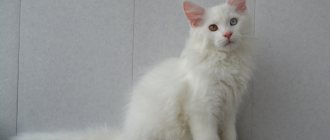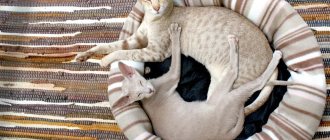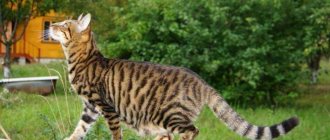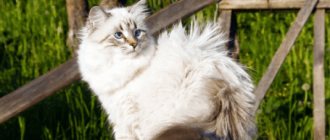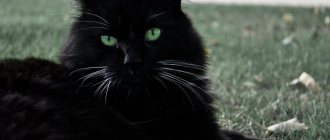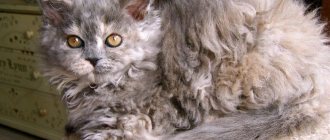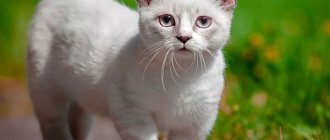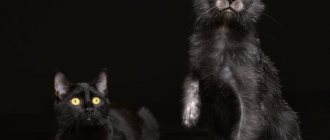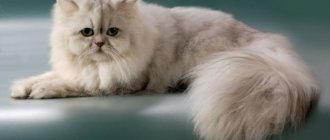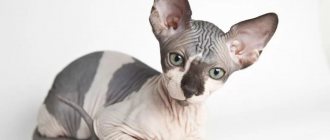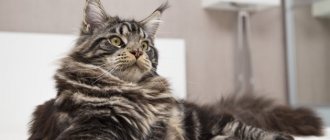Maine Coon Size Standards
Upon reaching 15 months, the growth of the coon is completed and until the age of three they gain only muscle mass.
The weight of a male at one and a half years old can reach 8-10 kilograms. Girls are more modest in size - about 8 kilograms. Before reaching the age of one year, there are some females that can be similar in size to the males. The weight of a coon may change after spaying and neutering (for cats). This is caused by hormonal imbalance. For such cats, you need to select special food and monitor physical activity. You can often find information that coons have enormous height and weight exceeding 25 kg. This is a very persistent myth that is simply a myth and a fallacy. If a Maine Coon cat exceeds 12 kg, this may indicate problems with the health of the animal.
There are official records for the size of coons that were exhibited at exhibitions and competitions. The largest cat had a body weight of 15 kilograms. The physique of this breed is muscular and has a large head. They have characteristic tassels on their ears and a long fluffy tail.
Maintenance and care
Caring for Maine Coon cats means, first of all, taking care of his health, timely visits to the veterinarian and having all the necessary vaccinations. It is recommended to vaccinate against ticks, regularly take prophylactic antiparasitic drugs, and take essential vitamins. Like any cat with thick hair, it is necessary to use a special paste to empty the stomach of hairballs, and it is also useful to grow grass that helps in cleansing the digestive organs. It is advisable to comb the coat at least 1-2 times a week.
For nutrition, you can use special food designed for large cats or natural products. With any choice, you need to keep quality and variety in mind. You can feed him lean meat (beef, rabbit, chicken) or boiled lean fish without small bones. It is advisable to supplement the diet with vitamin and mineral complexes, vegetables mixed with meat, kefir, low-fat cream and cheese.
What is the weight of an adult cat and Maine Coon cat?
The size and weight of a kun depends on many factors. The state of an adult cat is established at birth. The size of the animal is affected by:
- Genetics. If the kitten's parents were large and in good health, there is a high probability that the kittens will also be of impressive size.
- Floor. Males are larger and taller than females. Males also grow faster than their female counterparts.
- The use of hormonal drugs in a cat during certain periods.
- Conditions in which kittens grow up.
- Stress factor. If an animal is constantly exposed to stress, the endocrine system of the animal suffers first, which negatively affects further growth.
- Proper nutrition. It must be balanced. By following proper nutrition, healthy and strong coons will grow up with the correct size and weight.
Typically, a cat stops growing and gaining weight at the age of three. During this period it should reach its maximum size. For a male, the weight can range from 9-12 kg, castrated individuals can weigh 13-16 kg. All cats should be between 7-10 kg. The height at the withers can reach 25-40 cm. The length of the body from the nose to the tip of the tail can reach 100 cm, that is, 1 m. The maximum length established by the kunas is 1.23 m.
Thoroughbred animals with a good pedigree will look larger and more massive than their counterparts. This is dictated by a special genetic exterior.
Interesting facts about the breed
The most interesting facts about the Maine Coon breed are:
- big sizes. Some individuals reach a weight of up to 12 kg. The average weight of females is 7 kg, and males - 8 kg;
- ability to withstand frost thanks to thick and waterproof wool;
- various colors. They come in smoky, brown, tortoiseshell;
- love for water. They never refuse a bath and love to swim;
- unusual manner of communication, coons practically do not meow, but purr more;
- The length of a cat's tail can reach 70 cm.
Maine Coon weight by month
To understand what health condition a pet has, veterinarians have developed a special table that can be used to check its body weight.
How much do Maine Coons weigh: table by month.
Coon kittens grow very quickly and gain weight rapidly. When they reach 4 months, they can be the size of a normal adult cat. The pace of development slows down over the years and stops altogether after three years.
Birth weight
Kittens of this breed are larger in size compared to other cats. A newborn kitten weighs 120-170 grams, but for example, a Persian kitten weighs only 80-100 grams. If we take into account the average size, the usual weight of a coon kitten reaches 140 grams. In many ways, this figure may vary depending on the size of the entire litter. If there were five kittens, the weight could be within 130 grams, if there was only one kitten - 160 grams. The more kittens in the litter, the less their body weight will be.
Why does a Maine Coon kitten not gain weight?
As soon as the owner notices a discrepancy with the body weight table, it is worth seeking help from veterinarians. Insufficient recruitment can be caused by a number of reasons:
- lack of vitamins;
- non-compliance with energy balance;
- the kitten is stressed;
- genetic or acquired diseases of the kitten.
If a cat gives birth to small newborn kittens, they may develop more slowly and take longer to reach the required weight and body size. Larger ones develop much faster than their smaller peers. Small size is often due to genetics.
Sometimes there are situations when just small kittens are born. This can be called a genetic failure; it cannot be corrected. You should not give your kitten any supplements that affect growth on your own. All drugs should be prescribed only by a veterinarian and if there are compelling reasons for their use.
Why can a Maine Coon lose weight?
Body weight standards affect the portion of food that domestic coons should receive. If suddenly your pet begins to lose body weight, this may indicate the presence of health problems. It is important to take action in time and contact a veterinarian. Typically, there are many reasons for weight loss:
- change in diet or diet;
- poor nutrition;
- use of low-quality products;
- worms or other parasites;
- hereditary factors;
- hormonal imbalances;
- poor animal hygiene;
- serious illnesses.
At the first signs of weight loss, it is worth paying attention to the animal’s diet. Perhaps it is not receiving enough necessary nutrients. If there have been no changes in the diet, the cause may be the stressful state of the coon. In any case, weight loss is most often due to health problems. In this case, only specialists can help and immediately prescribe adequate treatment.
Material on the topic: all about the character and habits of Maine Coons.
Maine Coon kitten.
Physical activity
Sufficient physical activity is the key to the health and long life of absolutely any four-legged pet, and Maine Coons are no exception in this regard . The largest domestic cat in the world, it strikingly combines noble strength and refined grace with a gentle nature and playfulness. The Maine Coon Cat was bred a century and a half ago, but the fundamental characteristics of the breed were laid over many years due to the harsh nature of North America, so such a pet will need to be provided with sufficient physical activity to maintain health.
Maine Coons are distinguished by healthy curiosity and mobility, regardless of age, and regular physical activity for such animals is not just a whim, but a vital necessity and the key to the full development of a pet. Maine Cooncats need to exercise a lot to ensure that their muscles are stressed enough.
This is interesting! It is necessary to provide the Maine Coon with fairly frequent walks in the fresh air, using special cat leashes with collars or harnesses for this purpose.
Games for pets of this breed are perceived as simulating hunting, so you can purchase a small machine controlled by a remote control, which must be wrapped in a soft cloth. The object for the game can also be a toy mouse, a small ball or a traditional laser pointer.
Return to content
Factors influencing growth
Factors that influence the growth and development of the Maine Coon can be divided into two types - internal and external. Internal ones include:
- The growth rate of a kitten depends on the breed and its purebred. The higher your birth weight, the more you will gain weight in the future.
- Gender of the kitten. Boys grow faster and gain weight.
- Genetic predisposition. With a high degree of probability, parents of large sizes will have kittens of corresponding sizes.
- The combination of mom and dad's genotypes creates the kitten's own genotype. This is a unique organism that can have its own individuality.
- Hormones. The use of medications can affect the animal's body weight.
There are also external factors that have a significant impact on weight gain and growth of the Maine Coon. These factors include the hygiene of the animal and the conditions in which it lives. The attitude of the mother cat towards him greatly influences the growth of a kitten; sometimes a cat may deprive one of its cubs of attention and care. A newborn kitten should gain 10 grams in weight. in a day.
Popular questions
Popular questions among people dreaming of owning a coon include the following.
Why Maine Coons don't like to be held
Maine Coons, like other cat breeds, do not like being forced to do something against their will. They won't sit on your hands if they don't want to. This is explained by their independence and autonomy. For a cat to sit in your arms, it must be accustomed to this from childhood. But, these individuals often sit next to their owners on the sofa or desk, watching what their owner is doing.
Why does a Maine Coon dig when he drinks water?
The atypical relationship of coons to water is explained by their natural habitat near bodies of water. Their ancestors, in order to clear the drinking water of debris, raked it with their paws.
Attention : the desire of coons to work with their paws applies not only to digging water, but also to digging up and burying cat litter. They also love to dig in their food bowl.
Record holders
The largest Maine Coon in history had a body length of 123 cm. The tail was 41.5 cm long. This cat had a gray-smoky color, and the record itself was recorded on August 28, 2010. His name was Stewie, he lived in the USA, in the state of Nevada. Another record holder lived in Australia, his name was Omar. He weighed 14 kg. It had a length of 120 cm.
Maine Coon record holder.
One of the most sensational records concerning this breed lived in Australia and had similar dimensions.
The largest cat by weight lived in the USA. He reached a weight of 16.5 kg, and did not have any health problems that could cause such a body weight.
No artificial records
In order to achieve records, many owners begin to overfeed the cat or even introduce special hormonal supplements to quickly gain height and weight, thereby harming its health. Large weight impairs the functioning of the heart, liver, digestive tract, and also leads to metabolic disorders. This way the animal can die much faster. All this led to the fact that many international exhibitions and competitions canceled awards in this category.
Useful tips and tricks
The most important task for the owner of a Maine Coon kitten is to create the right diet for him, which will ensure the normal growth and development of the animal. For coons, natural food is preferable as it is most suitable for them. Veterinarians consider poultry, rabbit, and beef to be the most appropriate. Milk can be given to small kittens; it is not suitable for adults.
Now a number of manufacturers offer specialized food for their owners. They are produced keeping in mind the body weight and size of this cat breed. Such food can be combined with natural food. Veterinarians do not have a consensus on what type of feeding should be chosen. Each owner determines this independently for his pet.
Story
There are two versions of the origin of the breed. According to the first legend, Maine Coons originated from crossing a cat with a female raccoon. The only evidence here is the similarity of color. But, given the fact that we are talking about representatives of two different suborders of the order of predatory mammals - canines (which includes the raccoon family) and felines, this legend is far from reality.
The second, more plausible legend is the crossing of a cat and a lynx. This is supported by the similarity in color, size, and shape of the Maine Coon’s ears. But this version is not supported by serious researchers; most likely this amazing breed is the result of evolution without exotic crosses.
The breed got its name from the American state of Maine, and its first representative to gain worldwide fame was the cat Captain Jenks, shown in Boston in 1861. At one time, interest in this breed faded; representatives of the Persian breed were more popular in the late 19th and early 20th centuries. But it was preserved thanks to the interest of American farmers who liked the size and hunting qualities of Maine Coon cats. Today this breed is popular in many countries around the world and is a constant participant in various shows and competitions.
